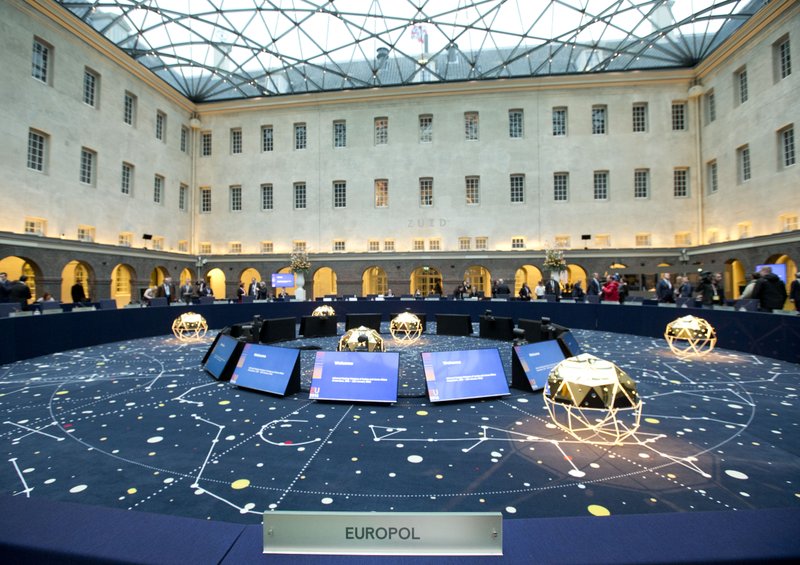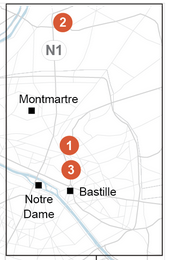PARIS -- Europe's top police agency issued a warning Monday: Islamic State extremists will keep attempting lethal attacks on soft targets in Europe as the militant group increasingly goes global.
"There is every reason to expect that IS, IS-inspired terrorists or another religiously inspired terrorist group will undertake a terrorist attack somewhere in Europe again, but particularly in France, intended to cause mass casualties among the civilian population," the Europol agency reported, using another acronym for the Islamic State. The warning comes about 2½ months after suicide bombers and gunmen killed 130 people in Paris.
The conclusions reached by experts from the European Union's chief agency for law enforcement cooperation and EU member states make clear that many, perhaps virtually all in Europe, may be at risk.
"Without reliable intelligence on the intentions, activities and contacts and travels of known terrorists it is nearly impossible to exactly predict when and where the next terrorist attack will take place, and what form it will take," the Europol report said.
Hours before the report was issued, a new video was released by the Islamic State celebrating the killers who carried out the Nov. 13 attacks in the French capital -- while also threatening fresh bloodshed.
The recording ends with one militant holding a severed head, footage of British Prime Minister David Cameron giving a speech, and an Islamic State warning that whoever stands with the unbelievers "will be a target for our swords."
The 17-minute video, released Sunday, shows the extent of the planning that went into the multiple attacks in Paris, which French authorities have said from the beginning were planned in Syria. All nine men seen in the video died in the Paris attacks or their aftermath.
All but two of the attackers were from Belgium and France and spoke fluent French. The two others -- identified by their noms de guerre as Iraqis -- spoke in Arabic.
Seven of the militants, including a 20-year-old who was the youngest of the group, were shown standing behind bound captives, described as "apostates," who were either beheaded or shot.
"Soon on the Champs-Elysees," says Samy Amimour, who was raised in a Paris suburb, as he holds a captive's head aloft.
The Nov. 13 attacks targeted a packed concert hall, a restaurant and cafe, and a soccer match at the French national stadium. The video glorifying the Kalashnikov-wielding gunmen and suicide bombers responsible for that attack was presumed to function as a recruitment tool.
French Interior Minister Bernard Cazeneuve said Monday's Europol report did not go markedly beyond previous warnings and was not intended to sow fear but "to look lucidly at reality."
Gilles Kepel, a political scientist who wrote Terrorism in France, said even if Islamic State extremists carry out new attacks in Europe, the video shows the group is increasingly desperate and likely on the wane -- in part because of the indiscriminate killings Nov. 13.
"They emphasize their ability to be cruel, to kill all their opponents and to terrorize everyone. But what is very striking is that I do not believe that they will have a significant amount of new sympathizers after those videos," he said.
"I believe that it's not really a display of strength. It's rather a display of weakness. Terrorism has its political economy of sorts. You have to terrorize people. On the one hand, you have to spread terror, but at the same time you have to gather sympathizers. If you're not able to have the two going together, then the model fails," he added.
Calling the danger of extremist violence "the most significant in over 10 years," Europol on Monday also officially opened a new European Counter Terrorism Center at its headquarters in The Hague, Netherlands. Europol Director Rob Wainwright said the new unit will have 40-50 experts in counterterrorism and deal in intelligence-sharing, tracking foreign fighters and sources of illegal financing and firearms and assisting EU countries in counterterrorism actions and investigations.
Wainwright told a news conference in Amsterdam that more than 5,000 EU nationals have been radicalized by fighting with Muslim extremists in Iraq and Syria, and that many have returned home to present a clear and present danger to public safety.
"The current threat demands a strong and ambitious response from the EU," Europol's chief said, referring to the experts' warnings of Islamic State plans for "large-scale attacks on a global stage with a particular focus on targeting Europe."
A Section on 01/26/2016



